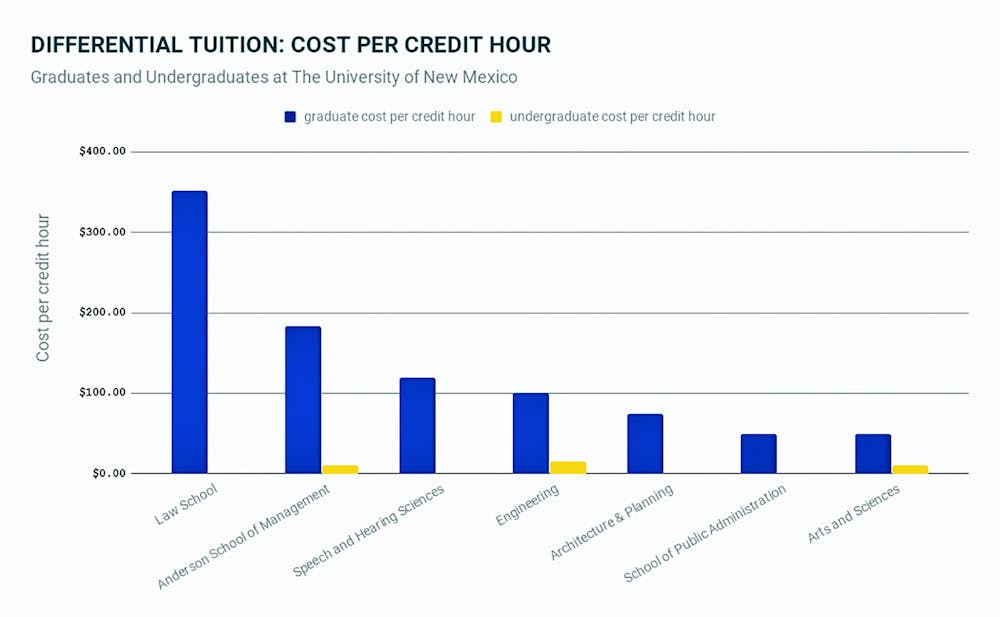SCHOLES HALL — While over half a dozen graduate programs at the University of New Mexico have adopted program-specific tuition increases, the masters of public health program in the College of Population Health won't — at least for this semester.
Graduate students Gabriel Gaarden and Alden Reviere made sure of it.
The students said they were invited to meetings about the College of Population Health's proposed $150 per credit hour tuition increase but said the administration failed to consider masters programs students' concerns about the increase.
"That information sharing has been too limited and has come too late," Gaarden read from a prepared statement.
Gaarden and Reviere spoke against the tuition increase during two Board of Regents committee meetings on Monday. During public comment in the first meeting, the two masters of public health graduate students killed differential tuition for their program. Their dean, Dr. Tracie Collins, withdrew the differential tuition proposal after Gaarden and Reviere's opposition.
But, for many other colleges and programs across campus, differential tuition is the new normal.
Typically, a university will charge students the same tuition rates whether they are engineering or education students. Differential tuition, sometimes called tiered tuition, charges students different tuition rates based on their major or academic college — in some cases, both.
Differential tuition has seen something of a domino effect at UNM. Over the last six years, nine programs and colleges used the controversial technique to boost dollars for themselves at a University in a budget crunch.
One of the early adopters was the Anderson School of Management.
Anderson embraced a differential rate in 2015. At first, the increase raised all Anderson students' tuition by $10 per credit hour. Per UNM policy, a department seeking differential tuition is required to fill out a questionnaire and eventually get approval from UNM's governing board.
Some of the questions they have to answer include: Why they want the additional money, what they'll do with the new cash, what similar schools do differential rates and what students think about the upcharge.
Anderson's Interim Dean Shawn Berman said the expected $540,000 extra per semester from differential tuition would be used to hire more faculty. Berman said in the questionnaire students were told about the price hike through "the advisement process" and via a letter.
Get content from The Daily Lobo delivered to your inbox
Berman also said in the questionnaire students could learn about differential tuition on the Bursar's website. The Regents approved Anderson's differential request in 2015.
In 2017, Anderson proposed another differential, this one levied exclusively on graduate students. It amounted to an additional $183.70 per credit hour. Anderson expected this fee to generate $1.73 million per semester.
For context, there were 651 graduate students and 3,097 undergraduates students enrolled at Anderson in 2017, according to UNM's Office of Institutional Analytics.
Berman didn't respond to a request for comment before this story went to print.
The differential tuition rates at Anderson are an extreme example of the disparity between graduates and undergraduates, but only by a few dollars.
Out of the nine colleges and programs that adopted differential tuition, graduate students pay an average of over $11 for every $1 that undergraduates pay, according to numbers provided to the Office of the Provost.
College of Population Health graduates won't be paying these rates this year, but Gaarden thinks his student organization's (Public Health Student Association) fight against differential tuition has just begun. He said he's sure the college will push for differential again next year.
"I don't know if the dean would have withdrawn her proposal if we weren't present today in that meeting to make this public statement in front of those nine committee members," Gaarden said.
Collins, the College of Population Health dean, was out of town and unavailable for comment, according to spokesperson Mark Rudi.
While masters of public health graduate students won't be paying differential this year, other colleges will.
The School of Public Administration requested to increase their graduate differential tuition from $50 to $100. The new Global and National Security Program requested to instate a graduate differential tuition of $150.
Both differential tuition rates will be up for a vote by the Regents on March 9 at the 2020 Budget Summit.
Justin Garcia is the Editor-in-Chief of the Daily Lobo. He can be contacted at editorinchief@dailylobo.com or on Twitter @Just516garc






